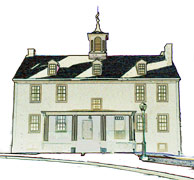|
With the death of Jacob Jones
in 1810 and the death of
his wife Mary in 1811, his wishes and the trust were established.
According to the Minute Book of the Trustees,
"...he [Jacob] having most generously
Bequethed a Lot of near ten acres of
Land for the purpose of erecting there
in a School house and Other Improvements and the sum of six thousand
three hundred and Eighty seven dollars a part thereof for erecting said
School house and Improvements and
the remainder to be placed at Interest
on Landed security and the Interest
thereof to be appyled to the Schooling
Poor Cnildren Inhabitants of Lower
Merion. To the foregoing donation is
to be added the sum of three Thousand five hundred and seventy seven
dollars being a Bequest of the Widdow Elizabeth George a sister of the
afforenamed donor: And the further
sum of One hundred and thirty three
dollars and Thirty three Cents being a
Bequest of his Nephew John Roberts;
which several sums fell to the direction of the Trustees appointed by the
will of Jacob Jones..."
Jacob apppointed five men and their heirs and assignees to oversee the
trust...Jonathan Jones, Algemon
Roberts, Henry Bowman, Jonathan Walters and David Roberts.
Before Jacob's death, Walters had died on April 1, 1806, but for some
reason, no amendment for replacement was made in the will or its codicil
(June 10, 1807).
This led to some confusion concerning whether the remaining Trustees could
legally act to fulfill the last wishes of Jacob.
Edward Tilghman offered his legal opinion, dated March 3, 1812: He advised
the Trustees that they could legally carry out Jacob's wishes with a
reduced number of trustees, but they should apply to the Yearly Meeting of
Friends in Philadelphia to appoint the fifth and any future trusees as
Jacob had requested in his will.
The Trustees applied to the Committee of Sufferings which was the primary
step before an educational matter could be placed before the Yearly
Meeting. The Committee decided not to represent the Trustees' problem
before the Yearly Meeting
and "...gave such umberage to Jonathan Jones as caused him to withdraw his
further assistance from the
remaining Trustees."
This event did not stop the construction of the school or the determination
of the Trustees to open its doors. Only three Trustees were functioning
without a problem until the death of Algernon Roberts in 1815.
At that point, Jonathan Jones returned to help the remaining two Trustees,
Henry Bowman and David Roberts. They again applied to the Yearly Meeting
(April 15, 1816) and
the Meeting decided
"...that it did not comport with the
nature and design of the Meeting to
take charge of such an appointment
and that it declined taking any further steps in the business."
The
extract from the Meeting defined
Jacob's wishes as, "...the establishment of a School for the free
Education, of poor and orphan Children
without regard to any Religious
Profession or denomination whatever, and also leaving the branches of
Education entirely in the discretion of
certain Trustees..."
Apparently Jacob's wishes were too liberal for 1816. The nature and
direction of the Committee of Sufferings and the Yearly Meeting obviously
had changed since Jacob's participation in those meetings
(almost 30 to 40 years before).
Replacing the vacancies of Roberts and Walters was not settled until 1819
when Jonathan Jones and David Roberts petitioned the General Assembly of
Pennsylvania to have the Trustees appoint the successors with the consent
of the Orphan's Court, Montgomery County.
Governor William Findlay approved a legislative act (March 16, 1819).
Because of this act, Jonathan Walters and Algernon Roberts were replaced by
Paul Jones, Jr. and Isaac Warner Roberts (Algernon's son).This act finally
established the process of Trustee succession which will last forever, as
the trust must.
The duties of the Trustees were numerous. In the beginning, they had to
decide who would build the school, how it should be constructed, how the
school would be
governed, who would qualify for the
"free of all expenses" schooling, and
who would teach.
|










